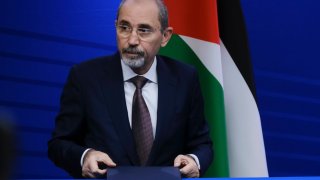Jordan’s Top Diplomat Walks the Tightrope in Tehran
Jordan's leadership faces a critical challenge: maintaining domestic stability while balancing its sovereignty and commitments to Western allies.
Jordanian Foreign Minister Ayman Safadi’s visit to Tehran marks the first time in nearly ten years that one of Amman’s top officials has visited Iran. The region is on the brink of war, and Jordan may soon have to choose between upholding its commitments to its allies and antagonizing its Palestinian-majority population.
Iran and its proxies have vowed to retaliate against Israel following the recent assassinations of Hamas chief Ismail Haniyeh and Hezbollah commander Fuad Shukr. Iranian media claim Safadi aimed to persuade Iran not to retaliate. At the same time, the Jordanian government framed the trip as an effort “to address disagreements between Amman and Tehran transparently for mutual benefit.”
Jordan today is facing the same dilemma it did in April, following Israeli airstrikes in Damascus that killed top officers from Iran’s Islamic Revolution Guard Corps. Iran struck back by launching more than 300 missiles and drones in Israel’s direction, several of them penetrating Jordanian air space on the way to their targets. The Iranian salvo confronted Amman with a difficult decision: Would it join the United States, Britain, and Israel in a joint effort to defeat the attack, or would it hold back to avoid riling up its population, many of whom would rather see Iran and Hamas prevail?
On the night of April 13, Jordan chose to assist Israel by intercepting Iranian drones over its airspace, leading Tehran to threaten, “The Iranian armed forces are closely monitoring Jordan's movements during the process of disciplining the Zionist entity. If Jordan participates in any potential actions, it will then become the next target.”
Jordan framed its decision as a defensive action to protect its sovereignty and airspace, not as a gesture of support for the Jewish state. This approach aimed to calm the public and mitigate any potential backlash.
Since October 7, Iranian proxies have incited protests in Jordan, especially after the assassination of Ismail Haniyeh. Demonstrations over the past week have shown increased support for Hamas, with marchers waving Hamas flags, wearing Qassam headbands, and chanting, “Our army is the army of the free...Protectors of the homeland...We are your soldiers, O Sinwar.”
The repercussions of an Iranian attack on Jordan are not only domestic. Safadi stated a few days ago in a clear signal to Iran that Jordan would rather not be a battlefield for any conflict and “will firmly confront anyone attempting to violate Jordanian airspace.”
In addition to inciting protests, Iranian proxies have increased their efforts to turn Jordan into a base for attacks against Israel. In March, Iraq-based Kataib Hezbollah threatened to “arm 12,000 Jordanians to defend their brethren in Palestine.” In April, Hamas spokesperson Abu Ubayda said, “the most important Arab front—especially popular and most concerning to the enemy—are the cherished Jordanian masses to whom we send our greetings and call upon to escalate their actions.” In June, reports in Arab media claimed that authorities found explosives in an apartment in Amman and linked them to new Iranian attempts to smuggle weapons and explosives into Jordan for domestic use.
Jordan’s leadership faces a critical challenge: maintaining domestic stability while balancing its sovereignty and commitments to Western allies. Safadi’s visit represents a crucial effort to dissuade Iran from involving Jordan in its regional conflict with Israel. However, Amman must remain cautious. The Islamic Republic has long harbored ambitions to destabilize Jordan, and its malign networks in the region have been the primary source of Amman’s security challenges.
In the event of an Iranian or proxy attack targeting Israel, Jordan should replicate its defensive posture from the night of April 13. This approach will help maintain its reliability and important security relationship with Israel and the United States. Additionally, Jordan should employ the same narrative it used on that night, framing the action as purely defensive to dampen any potential uproar.
Ahmad Sharawi is a research analyst at the Foundation for Defense of Democracies.
Image: Alexandros Michailidis / Shutterstock.com.

